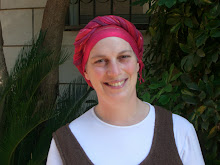 On Erev Yom Kippur I received an email from my friend Yael Resnick (the editor of Natural Jewish Parenting magazine) including a tefillah written by her friend Yonit Lea Kosovske, entitled "Al Chet Prayer for Parents". Since parenting matters tend to fill my mind, oh, about, 99% of my waking day, I thought I'd take a good look at it.
On Erev Yom Kippur I received an email from my friend Yael Resnick (the editor of Natural Jewish Parenting magazine) including a tefillah written by her friend Yonit Lea Kosovske, entitled "Al Chet Prayer for Parents". Since parenting matters tend to fill my mind, oh, about, 99% of my waking day, I thought I'd take a good look at it.The first couple of lines read as follows:
"For the mistake we have committed before You by losing patience with our children,
And for the mistake we have committed before You by losing our temper."
Oh boy. This was not written for the faint of heart.
Now, like I said, I think about how I parent my kids a lot. I'm trying to figure out, more than anything else, how to raise them so that one day they will become adults that are thoughtful, ethical people who love God and are kind to others.
I try to say yes to the kids as often as possible, because I have a tendency to say no. I prefer to feed them food not enhanced by additives, colouring or flavouring. When learning issues arise, I try to figure out the best route to success; when someone's behaviour needs a little nudge in a certain direction, I think about how we can motivate this child. We keep plastic and electronic toys to a minimum, and artsy creative stuff and board games to a maximum. Typical, regular, conscientious parenting. Yawn.
So reading this Al Chet was breathtaking. After a few lines, I could barely believe someone had written it. And when I counted, it was 8 pages long: all those lines of everyday awful parenting moments. Why would I read this? Over a hundred ways to feel bad about myself!
When I say the Al Chet on Yom Kippur, I typically try to focus on what the words really mean, and find a way to link them to my life. But it doesn't hurt. It is successful in that I become more self-aware, have regrets, have intention to improve. But this comprehensive description of my life, presented to me as a list of mistakes, was overwhelming. I printed it off anyway, glanced at it when I walked past the desk, thought about it a lot.
Eventually, I read it, all 8 pages, beginning to end. Yes, it was painful. But also validating. Someone had bothered to delineate the thousands of decisions and actions we make every day as parents. Someone noticed that we put a lot of effort in and acknowledged that sometimes we lose it.
"For the mistake we have committed before You by saying NO too many times,
And for the mistake we have committed before You by not saying NO enough."
Doesn't that say it all? The line we walk is all too fine. If it's not one mistake, it's another. By trying to redress the balance, we sometimes over-correct. So be it. This "Al Chet" brought every day moments to my immediate attention, and made me want to improve. The point is, I think, to be in the game, and to pay attention.
(Yonit Lea Kosovske's tefilah can be read at http://www.natural-jewish-
(Photo credit: http://commons.wikimedia.org/wiki/File:A_prayer_to_God_in_the_Western_Wall_in_Jerusalem.jpg)










